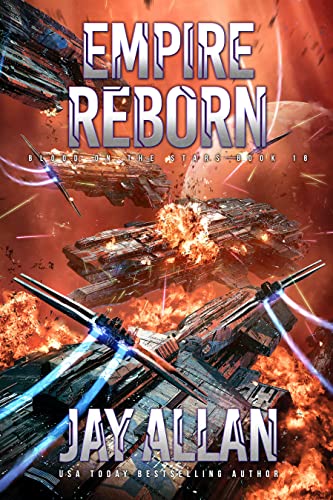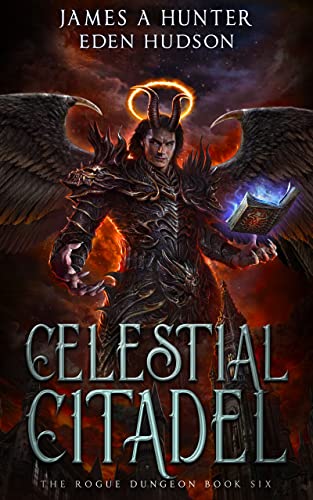This month brings the conclusion to two notable independent science fiction and fantasy series: Blood on the Stars by Jay Allan and The Rogue Dungeon, by James Hunter and eden Hudson.
 The battle against the Highborn has come down to one desperate last gamble before the worlds of the Confederation inevitably fall. Yet Tyler Barron still leads the last free remnants of humanity against this scourge that felled the Empire centuries earlier. But, unknown to him, the Highborn face a war on two fronts, and their second opponents are stirring once more. Will Barron find unlikely allies or a final, unbeatable menace in the far distant stars beyond the Highborn’s? And who will rule space for the next 10,000 years?
The battle against the Highborn has come down to one desperate last gamble before the worlds of the Confederation inevitably fall. Yet Tyler Barron still leads the last free remnants of humanity against this scourge that felled the Empire centuries earlier. But, unknown to him, the Highborn face a war on two fronts, and their second opponents are stirring once more. Will Barron find unlikely allies or a final, unbeatable menace in the far distant stars beyond the Highborn’s? And who will rule space for the next 10,000 years?
With a title like Empire Reborn, the fate of the galaxy is not in doubt. 17 previous books in Blood on the Stars led to a certain resolution. It is time to see how Jay Allan’s rollercoaster space opera plays out. And, as the heir to Honor Harrington, it does follow in the familiar steps of the Salamander. At this point, as in Honor Harrington, there is no further escalation possible against the remnants of empire and a slaver race. And, as with Honor’s conclusion, a desperate battle is paired with a personal conclusion that comes across as unearned. But sometimes it’s about the journey instead of the destination, and Allan continues to deliver smart, WWII-style naval combat without resorting to constant and convenient tech breakthroughs. At this scale of destruction, the damage control dramas that fueled previous books are no longer possible, leaving only the profiles of heroism and raw nerve needed to defeat an almost invincible foe.
Compared to Honor Harrington, the political situation of Blood on the Stars is simplified and almost simplistic. And this works against the conclusion and Barron’s reward. The politics just do not demand the solution and the high office thrust onto our hero’s shoulders. But this simplified setting reduces the exposition burden and subsequent page count. The absence of Byzantine politics, combat as an accounting exercise, and Weber’s particular axes to grind makes Blood on the Stars a “good parts” version of the classic space opera, especially for those more interested in the “wooden ships and iron men (and women)” aspects of space opera. And if, after an explosive finale, Allan’s space opera did not quite stick the landing, he’s in the same company as Weber, Rowling, and Jordan with that.
 The gameworld Roark van Graf had teleported himself into no longer exists. Sections of that reality have now overwritten themselves on Los Angeles, bleeding video game monsters and the Tyrant King Marek’s forces onto Earth. Worse still, the Tyrant King’s power and influence stretch across worlds, including Roark’s homeworld.
The gameworld Roark van Graf had teleported himself into no longer exists. Sections of that reality have now overwritten themselves on Los Angeles, bleeding video game monsters and the Tyrant King Marek’s forces onto Earth. Worse still, the Tyrant King’s power and influence stretch across worlds, including Roark’s homeworld.
And the Tyrant King has the ability to rewrite reality to his whims.
Now Roark must summon his allies from across three worlds and a jumbled mishmash of realities to put down the Tyrant King before Marek can destroy the pillar at the center of all creation.
Maybe then, his family will be avenged.
James Hunter’s and eden Hudson’s Rogue Dungeon series began as a dungeon builder litRPG. With Celestial Citadel, it has transitioned into full-blown epic fantasy, with the fate of all worlds resting on one rebel’s head. The humor, occasionally bordering on irreverence, is still present, as are some of the gaming conventions introduced in the first book. But the scope has radically changed.
Dungeon building fantasies exist in a weird tension between small, local, and intimate stories surrounding the fixed location of the dungeon and the call towards epic fantasy. Few have navigated the jump between local and global threats, and fewer have managed to do so without losing their focus and characterizations along the way. Celestial Citadel manages to do so, although something in the voice of the prose shifted over time. I had to check the spine to see if James Hunter had added a new author to the series.
But that is a small price to pay for a story that not only gets the gamer and litRPG right in tenor, tone, and prose, but marries it to an interesting cosmology befitting Amber or Heaven itself. One built upon noblesse oblige, as even the toxic griefer, troll, and utter pain in everyone’s side Scott “Pwnrboner” learns in the ruins of Los Angeles. And this revelation turns Roark’s quest for revenge into something higher–vengeance for all the worlds Marek has despoiled before he crossed paths with Roark the Griefer. And the final battle against Marek proves to be salvation for those long extinct races.
Justice is served, by the most unlikely of hands. That of a once spoiled rebel noble turned toxic gamer and cheat, now matured by responsibility, wisdom, and loss.
Let’s be fair, Celestial Citadel ties up into a nice, pretty bow, as does Empire Reborn. And in a similar too-convenient manner. But where Empire Reborn’s denouement comes across as unearned, Hunter and Hudson have been building the foundation for Roark’s duties, fortune, and happiness since the first page of Rogue Dungeon. Roark’s reward feels earned, not just because the progression towards it has been laid out before him from the start, but because he has also been changed by his journey into someone worthy of it.
And it is because of this resolution that I am glad the Rogue Dungeon series ends here. It would be too easy to serialize Roark’s adventures past this point in a cash grab. This happens all the time in indie, YA, and light novels, often to the detriment of the series (see: Shield Hero, My Life as a Villainess, and others). Hunter and Hudson have managed to do something rare in this current market: end a series in a way that satisfies its readers. And I do hope they stick to it.
Please give us your valuable comment